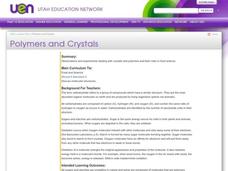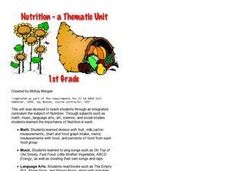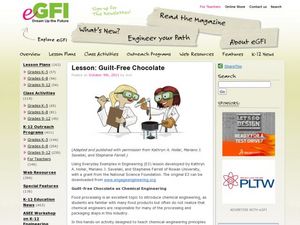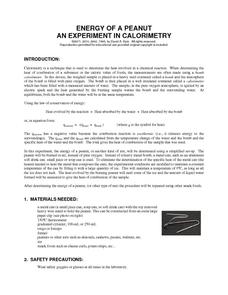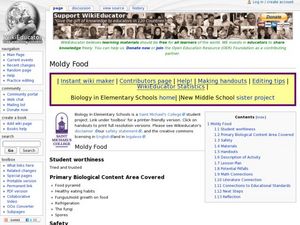Curated OER
Food Science, Scientific Method: Reliability and Validity in Empirical Research
Secondary learners explore food science by conducting an experiment using the scientific method and creating a science fair project based on their findings. They learn about food technology and modern research development. They...
Mascil Project
Molecular Gastronomy - Science in the Kitchen
Some say cooking is an art—and a science! Scholars scope out the savory subject of molecular gastronomy with a series of related activities. The teacher's guide contains printable worksheets and helpful tips for implementing the lesson.
Curated OER
Polymers and Crystals: Their Role in Food Science
Blend chemistry with cooking in this exploration of polymers, carbohydrates, and food science. Experimenting with gelatin produces concrete examples of the bonding and ploymerization discussed in the lesson plan. Copious, comprehensive...
University of Georgia
Energy Content of Foods
Why do athletes load up on carbohydrates the evening before a competition? The lesson helps answer this question as it relates the type of food to the amount of energy it contains. After a discussion, scholars perform an experiment to...
Curated OER
Fast Fats: A Nutritional Analysis of America's Obsession with Fast Foods
How do you read a nutritional label? Help high schoolers practice reading nutritional labels on foods so they can calculate the calories in different types of foods. They will also examine the effects of fat on the body and the link to...
Curated OER
Nutrition: A Thematic Unit
Young learners explore nutrition and the food groups in these two mini-lesson plan ideas. First, kindergarteners have a discussion about their health and how different foods contribute to it before making their own personal food pyramid....
Baylor College
Food for Kids
Immediately capture the attention of your class with the smell of freshly popped popcorn in the sixth lesson of this series on the needs of living things. Young scientists first use their senses to make and record observations of...
Curated OER
Apples: Family and Consumer Science
Learning to cook and making good food choices are extremely important life skills. Seventh graders explore food science in relation to health and nutrition, by conducting several experiments on apples. Websites, movies, and instructional...
Curated OER
Summer Science Recipes: Experiments on the Grill and in the Kitchen
Generate ideas about the most scientifically sound ways to prepare foods safely and efficiently during the summer season. Learners will use the GED Connection Science Workbook, so they can practice the skills needed to prepare for the...
Curated OER
Food Preservation: Food Science, Canning, Gardening
Learners consider the procedures and safety issues involved in food preservation. They conduct experiments in canning, freezing and drying. If everyone can preserve food utilizing a variety of methods and science principles, the...
Curated OER
Lesson: Guilt-Free Chocolate
Experiment with chocolate coating on cookies! What a delightful way to learn about food processing and chemical engineering. Throughout this activity, groups collect measurements and make calculations. They conclude by writing...
Chymist
The Extraction and Identification of Artificial Food Colors
Did you know some food dyes are considered safe while others are considered carcinogenic? During the experiment, young chemists extract artificial food colors from prepared foods. Then, they use chromatography paper to identify which...
World Wildlife Fund
Arctic Food Chain
Explore the food chains that support Arctic ecosystems. A class discussion on interdependence and the different roles plants and animals play in ecosystems provides young scholars with the knowledge to complete a worksheet asking them to...
Curated OER
Genetically Modified Food (GMF)
Explore genetically modified foods through various experiments. In this biology instructional activity, students discuss the safety issues related to GMF's. They conduct a PCR analysis to identify the presence of genetic modification.
Chymist
Energy of a Peanut
Are you nuts? An engaging experiment burns nuts to find their kilocalories. Young chemists analyze at least two different types of nuts with their experimental results versus what is on the package. The resource offers a great lab for...
NASA
Producers Make Their Own Food
During an inquiry-based activity, scholars decide which variable to test and then design an experiment to determine the needs of producers. After two weeks, they complete a full analysis and research paper.
Curated OER
Independent Plant Growth Experiment
This is an awesome lesson filled with tons of engaging learning activities. Over a period of weeks learners will make observations, collect plant and analyze plant data, read and review agricultural articles, design and conduct an...
Curated OER
Food Choices The Pyramid Way
Learners develop skills in making nutritionally-sound food choices. Keeping a food diary, they analyze their food intake using the food pyramid as a guide. Students identify and explain the relationship of nutrition to personal health...
Consortium for Ocean Science Exploration and Engagement (COSEE)
Carbon Dioxide & Krill: Impacts
What effects do temperature and carbon dioxide levels have on the zooplankton of Antarctica? This concluding lesson plan in a short unit on climate change and the ocean helps environmental scientists answer these questions. After...
Nuffield Foundation
How Much Energy Is There in Food?
People associate calories with food, but what is a calorie? Young scientists measure the number of calories in samples of food to better understand the concept. They test a variety of samples, take measurements, and compare their results...
National Wildlife Federation
Soil Decomposers
The class studies the soil food web that includes earthworms and conduct four experiments using the crawly critters. Individuals determine whether earthworms are sensitive to light, touch, temperature, and acid.
Curated OER
Moldy Food
Students investigate how mold grows on food. For this mold lesson, students review the food pyramid before growing mold on different foods in Zip-Loc bags. They create graphs that show how long it takes for mold to grow on different...
Salt River Project
How Do We Clean Polluted Water?
How do we clean up oil spills and other pollutants in the water? Explore water treatment strategies with a set of environmental science experiments. Groups remove oil from water, work with wastewater treatment, and perform a water...
Curated OER
Life in Extreme Environments - Who is on Top in the Food Chain?
Young scholars discuss the design of experiments to determine how much and how fast rotifers feed and design experiments with a lab partner and in small collaborative groups. They then collect data from experiments and present results of...




